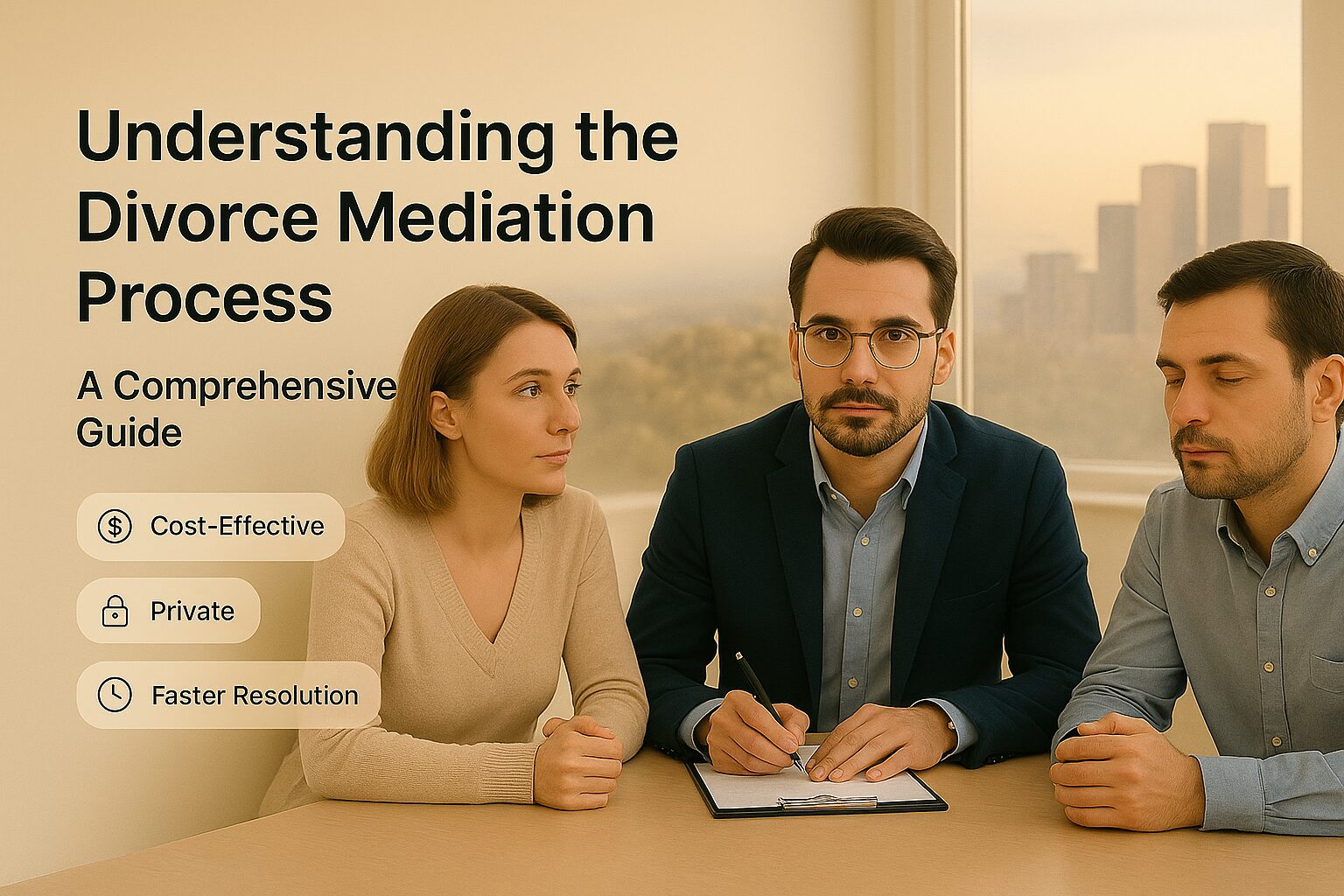Divorce is rarely easy. The divorce mediation process provides a way to reduce stress and conflict, making a challenging situation far more manageable.
For many couples facing divorce, mediation sessions offer a proven, cost-effective alternative that’s far less emotionally draining compared to traditional court litigation.
In this comprehensive guide, our Denver divorce mediation expert, Laura Shapiro, will walk you through:
- How divorce mediation works
- The key benefits of mediation
- Practical tips for preparing for your mediation sessions
- Creating a successful mediation agreement
By the end of this guide, you’ll have the knowledge and confidence you need to successfully navigate the divorce mediation process and reach an agreement that works for you.

What is Divorce Mediation?
Divorce mediation is a voluntary and cooperative process.
Although Colorado courts now require it in most divorce cases.
During mediation sessions, both spouses work with a neutral third party (the divorce mediator) to negotiate and resolve key issues, including:
- Child custody and child support
- Spousal support
- Property division
Here’s the key difference:
Unlike traditional divorce litigation, where a judge decides outcomes, divorce mediation puts you and your spouse in control.
Mediation makes it easier to achieve an uncontested divorce and craft a personalized mediation agreement tailored to your family’s unique needs and circumstances.
The ultimate goal of mediation is simple: Resolve divorce issues amicably and efficiently, creating a clear, workable agreement—without the emotional and financial stress of a courtroom battle.
Advantages of the Divorce Mediation Process
Choosing divorce mediation provides several key advantages over traditional divorce proceedings.
Here’s why mediation might be the perfect choice for you:
Cost-Effective
Mediation is often far less expensive than a traditional litigated divorce.
Why?
Because mediation sessions avoid costly court proceedings, and couples typically split the cost of the mediator.
This arrangement significantly reduces expenses compared to hiring separate divorce lawyers for a contested divorce and going through a court battle.
Confidentiality
Unlike court trials, the mediation sessions are completely private and confidential.
Anything discussed remains private and can’t be used later in court.
Unless it’s included in your signed mediation agreement.
This privacy allows for open dialogue without fear of sensitive information becoming public record.
Control Over the Outcome
Want to stay in control?
Mediation lets you make decisions about child custody, spousal support, and the division of assets directly with your spouse.
Not a judge.
This approach allows the parties to craft a personalized divorce settlement agreement that reflects their needs and those of their children.
Less Time and Stress
Divorce doesn’t have to drag on for months or years past the mandatory 91-day waiting period.
Mediation often leads to a faster resolution than going to court.
The process is also less adversarial.
The collaborative nature of mediation sessions helps reduce stress and fosters more productive dialogue.
This is especially critical for resolving sensitive child custody issues or unresolved issues between parents.
For a deeper look at the advantages, read The Benefits of Divorce Mediation.
Preparing for Divorce Mediation
Preparation is key to a successful mediation. Before entering the mediation process, there are several steps you should take:
1. Choose the Right Mediator
Selecting an experienced divorce mediator who specializes in family law is crucial.
You need someone who understands the intricacies of divorce and can handle complex issues like property division, child support, and financial matters.
Pro Tip: Look for mediators with a solid reputation, clear credentials, and a proven record of successful mediation sessions.
2. Gather Financial Documents
Mediation requires transparency, especially when it comes to financial matters. Prepare thoroughly by gathering all relevant financial documents, including:
- Tax returns (last three years)
- Bank statements for all accounts
- Documentation of retirement accounts and investments
- Real estate deeds and mortgage statements
- Credit card and loan statements
If you’ve already completed and exchanged financial disclosures, which is recommended before mediation, then you’ve already finished this part of your preparation.
Having these financial documents exchanged and readily available ensures your negotiations around asset division, spousal support, and financial information are fact-based and fair.
Check out our Divorce Mediation Checklist to ensure you’re prepared.
3. Clearly Define Goals
Before your mediation begins, clearly outline your objectives:
- Are your priorities focused on ensuring fair child custody arrangements?
- Is your primary concern securing spousal support or fair property division?
- Do you have specific goals about maintaining your home or dividing retirement accounts?
Setting clear goals beforehand helps guide your mediation, keeps negotiations productive, and ensures your final mediation agreement addresses your core concerns.
When both parties understand each other’s objectives, finding solutions becomes clearer, quicker, and less stressful.
The Divorce Mediation Process Step-by-Step
Understanding the steps involved in divorce mediation will help you navigate the process more effectively:
The Initial Conversation
The mediator begins the mediation session by clearly defining their role, how they conduct their mediations, and establishing ground rules.
This initial discussion provides each party with the opportunity to ask questions, ensuring they fully understand what to expect during the session.
Identifying Key Issues
Next, the mediator helps you identify and prioritize key issues to resolve.
Common discussion points include child custody, spousal support, property division, and debt allocation.
Why is this important?
This step helps set a clear and organized agenda for your mediation sessions, ensuring each issue is addressed thoroughly.
Information Sharing
Both parties are required to share all relevant information, particularly financial details.
Full disclosure of income, assets, debts, and financial records ensures that both parties are negotiating in good faith and can make fair and informed decisions.
Important: Ideally, both parties have completed financial disclosures before mediation.
During the mediation session the mediator will facilitate the exchange of any additional documentation.
Typically, both sides will create a property division spreadsheet to propose to the other side. However, the mediator may assist in developing a spreadsheet.
Negotiating Solutions
At this stage, the mediator’s role becomes crucial. With all relevant information on the table, the mediator guides both spouses toward productive discussions.
The mediator actively encourages effective communication and assists both parties in finding creative solutions to resolve their differences.
This structured support helps both spouses remain focused, collaborative, and motivated to reach practical, mutually beneficial agreements.
Reaching a Mediated Agreement
Once you’ve resolved all key issues, your mediator drafts a formal Mediation Agreement, commonly referred to as a Memorandum of Understanding (MOU).
This agreement details all terms agreed upon, including parenting plans, spousal support, child support, and a clearly outlined division of assets.
Both parties then review and sign the MOU before submitting it to the court, once accepted by the court your agreement is legally binding.
Common Issues Addressed in Mediation
During mediation sessions, couples typically address a wide range of critical issues to develop a comprehensive mediation agreement.
Common topics include:
- Child Custody and Parenting Plans: Developing a detailed parenting plan focused on the children’s best interests, including visitation schedules, decision-making authority, and other essential considerations.
- Division of Assets: Determining how marital property, such as homes, vehicles, investments, retirement accounts, personal property, and other significant assets will be divided equitably.
- Spousal Support: Establishing fair spousal maintenance or alimony based on the financial situation, income, and expenses of each party.
- Child Support: Agreeing upon an appropriate amount of child support in compliance with state laws and guidelines.
- Debt Division: Deciding how debts (credit cards, loans, mortgages, etc.) will be allocated fairly between both spouses.
Clearly addressing these areas during your mediation session ensures your final mediation agreement is comprehensive, fair, and tailored specifically to your family’s unique circumstances.
Post-Mediation: Finalizing the Divorce
You’ve reached an agreement through mediation.
Great!
But there are still a few critical steps before your divorce is officially finalized:
Legal Review
It’s advisable to have the mediated agreement reviewed by a Family Law attorney to ensure it meets legal standards and protects your legal rights.
Your attorney can offer legal advice and confirm that the agreement is fair and enforceable.
Filing the Agreement with the Court
Once your mediation agreement has undergone a legal review and is finalized, it’s submitted to the court and incorporated into the final divorce decree.
Why is this important?
This critical step ensures that all terms agreed upon, such as child custody, spousal support, and division of assets, become a legally binding court order.
Implementing the Agreement
After the court approves your agreement and issues a final divorce decree, both parties must actively follow through with the agreed-upon terms.
Common steps include transferring property, adjusting child custody arrangements, and beginning spousal support payments as outlined in your finalized mediation agreement.
Following these steps ensures the smoothest possible transition post-divorce, reducing stress, future conflicts, and additional legal fees.
Still comparing options? Check out Divorce Mediation vs. Lawyer to weigh both sides clearly.
Here is Why Mediation is a Better Option
The divorce mediation process offers a more collaborative, private, and cost-effective solution to ending a marriage.
Here’s the truth: By emphasizing cooperation and conflict resolution, mediation sessions help divorcing couples create a personalized mediation agreement tailored specifically to their needs.
The process is quicker, less stressful, and far less expensive than traditional litigation, making it an ideal choice for couples seeking an amicable separation.
Need help navigating your divorce?
Consider the proven benefits of mediation and discover how it can save you time, money, and emotional strain.



